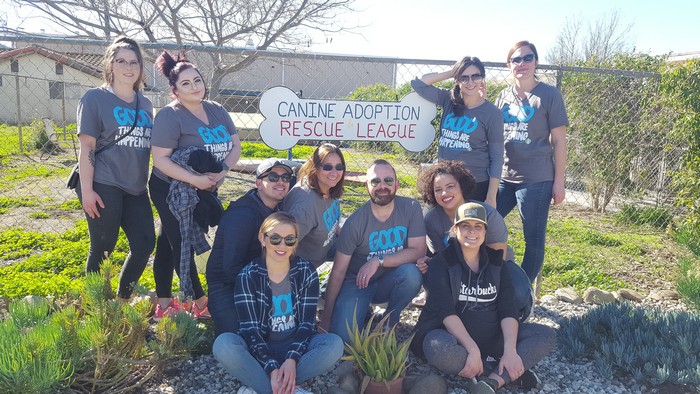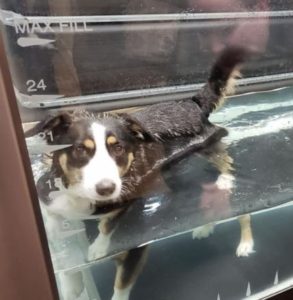
 •Starbucks completed their Community Day of Service at the CARL kennels on January 23. These strong and hard workers picked up heavy artificial turf and took it to the dumpster, sanded and painted a picnic table, pulled weeds and cut down a dead tree. Thank you, Starbucks, for picking CARL to do your Day of Service! Some of the employees may be returning to be volunteers!
•Starbucks completed their Community Day of Service at the CARL kennels on January 23. These strong and hard workers picked up heavy artificial turf and took it to the dumpster, sanded and painted a picnic table, pulled weeds and cut down a dead tree. Thank you, Starbucks, for picking CARL to do your Day of Service! Some of the employees may be returning to be volunteers!
•Animal hospital turns to underwater treadmill to help cats and dogs improve their health.

Imagine being able to give your pet the benefits of a one-hour walk with only 10 minutes of effort. It’s a concept that’s being tested by an animal hospital. The Walden Animal Hospital is home to an underwater treadmill. It’s an exercise machine on which dogs — and sometimes cats — can get a really good workout in a short amount of time. The treadmill is being used to help pets recovering from surgery, or to help them lose weight and become more active.
The Walden Animal Hospital has a water treadmill which helps dogs increase resistance, eases pressure on joints and increases circulation. Hospital staff member Lariviere says the underwater treadmill helps animals build up muscle mass, without it being pain. “The water provides resistance,” she said.
• According to a new study in the Journal of Anthropological Archaeology humans may have domesticated dogs 14,000 years ago, during the Epipaleolithic period. It was the beginning of a beautiful relationship.
The study, by archaeologists from the University of Copenhagen and University College London, looks at animal bones found in a Neolithic settlement known as Shubayqa 6, established 11,500 years ago, in the Black Desert of northeast Jordan. The bones suggest that the site’s residents were using their dogs to help them hunt which was the beginning of dog domestication. It hasn’t been clear, the researchers stated, whether that process was deliberate or accidental, but this new evidence of canine-assisted hunting implies that these Stone Age humans were highly dependent on their dogs.
At Shubayqa 6, the evidence for a hunting partnership between humans and dogs, who would’ve been more similar to wolves than the domesticated canines we know today, is written in the bones themselves. The remains bear “unmistakable signs of having passed through the digestive tract of another animal,” said lead author Lisa Yeoma and some are larger than anything even the most determined humans could shove down their gullets.
•Since the legalization of marijuana in California, cases of pets accidentally eating pot have jumped 130 percent. What should you do if your pet ingests marijuana? Get your pet to the vet immediately.
Many times, inducing vomiting is the best solution and then observation until the effects wear off. In most cases this is not life-threatening but leave the care to your vet so they can monitor their vitals.
• Armstrong Ambulance (in Arlington, MA ) EMS staff members received in-depth training from veterinarian Beth Eisenberg that would help them treat a K-9 injured in the line of duty.
EMS providers trained with a black lab to learn how to properly listen to its heart and lungs, as well as how to locate its pulse. They also learned how to provide safe transport, how to treat trauma wounds and practiced CPR on a K-9 mannequin.
“We work closely with police departments and other law enforcement agencies which includes their K-9 members, so we want to be prepared to provide critical lifesaving aid to anyone at a scene who may need it,” Armstrong CEO Richard Raymond said. “Our team members did an excellent job building an understanding of how they can provide immediate help to injured dogs just like they would with an injured person.”
• While vitamin D is “an essential nutrient for dogs … very high amounts can cause serious health problems like kidney failure or death,” the FDA said in a statement. Dog food recalls were issued after pet owners contacted the food and drug agency with reports of vitamin D toxicity in their dogs after they consumed food from some brands.
“FDA scientists have evaluated samples of some of these products, and state and private lab test results indicate that the food contained as much as approximately 70 times the intended amount of vitamin D,” the FDA added.
In severe cases, vitamin D toxicity can lead to kidney failure or even death in dogs. Those who survive may have “long-term impairments,” including kidney or heart disease, which require “life-long management,” according to VCA Animal Hospitals.
If your dog eats one of the affected brands, be on the lookout for vomiting, loss of appetite, increased thirst, weight loss, increased urination and excessive drooling — all of which are signs of vitamin D toxicity, according to the FDA.
“Pet owners should discontinue feeding these recalled products,” the FDA said, noting “the only pet products that have been impacted are food made for dogs” at this time.
Contact your vet to find out recalled products.
